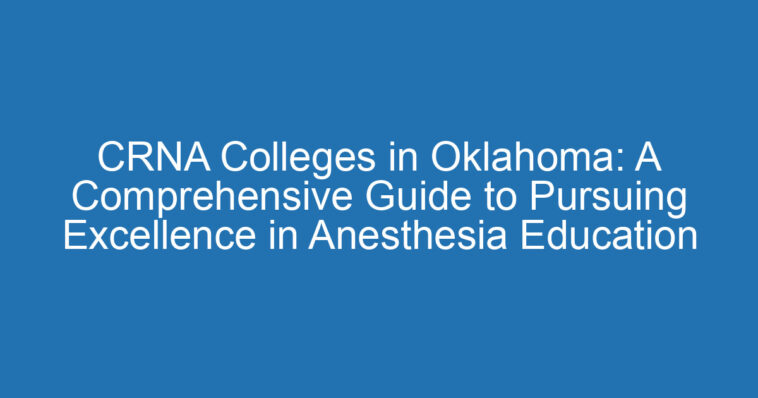In the evolving landscape of the healthcare industry, the role of nurse anesthetists, particularly Certified Registered Nurse Anesthetists (CRNA), is increasingly significant. They provide invaluable services in different healthcare settings, administering anesthesia and ensuring patient comfort and safety during surgical procedures. Becoming a CRNA entails a rigorous course of study and clinical practice, a journey facilitated by CRNA colleges. This article takes a closer look at such institutions in Oklahoma, aiming to provide interested candidates with a comprehensive overview of what Crna entails, the schools offering the program and it’s requirements.
What is CRNA All About and Reasons To Pursue A Career In The Field
Certified Registered Nurse Anesthetists (CRNAs) are advanced practice registered nurses (APRNs) who specialize in providing anesthesia care to patients in a variety of healthcare settings. Here’s a summary of what CRNAs do and reasons why you might consider pursuing a career as a CRNA:
1. Anesthesia Expertise:
CRNAs are highly skilled professionals who administer anesthesia to patients before, during, and after surgical or medical procedures. They work closely with surgeons, anesthesiologists, and other healthcare professionals to ensure patient safety and comfort during anesthesia administration.
Education and Training: To become a CRNA, you must complete a Master’s or Doctoral degree in nurse anesthesia. The educational program includes rigorous coursework in advanced physiology, pharmacology, pathophysiology, and anesthesia principles.
2. Autonomy and Responsibility:
CRNAs often work independently and have a high level of autonomy in their practice. They are responsible for assessing patients, determining appropriate anesthesia plans, administering anesthesia, monitoring patients’ vital signs, and managing pain during and after procedures. This level of responsibility allows CRNAs to play a critical role in patient care.
3. Versatile Career Opportunities:
CRNAs are in demand and can work in various healthcare settings, including hospitals, surgical centers, dental offices, obstetric units, pain management clinics, and the military. This versatility provides opportunities for career growth, specialization, and the chance to work in different healthcare environments.
4. High Earning Potential: CRNAs are among the highest-paid nursing professionals. Their specialized skills and responsibilities often come with competitive salaries. Additionally, CRNAs may have the opportunity to earn additional income through overtime, on-call shifts, or working in high-demand areas or specialties.
5. Job Outlook and Demand: The demand for CRNAs continues to grow due to factors such as an aging population, increased need for surgical procedures, and expanded roles of APRNs in healthcare. This strong job outlook provides stability and potential job opportunities in various geographic locations.
6. Patient Care and Impact: Becoming a CRNA allows you to have a direct impact on patient care and outcomes. You are involved in every step of the anesthesia process, ensuring patient safety, pain management, and comfort during procedures. Being able to provide vital support to patients during critical moments can be rewarding and fulfilling.
Considerations for Choosing a CRNA College in Oklahoma
When choosing a CRNA college in Oklahoma, there are several important factors to consider. These factors include accreditation, faculty expertise, clinical opportunities, and alumni success.
Accreditation is a crucial aspect to consider when selecting a CRNA college. Accreditation ensures that the program meets the highest standards of quality and prepares students for the challenges of the profession. The COA is the accrediting body for nurse anesthesia programs in the United States. It is important to choose a CRNA college that holds accreditation from the COA, as it guarantees that the program meets the necessary educational standards.
Faculty expertise is another vital consideration. Look for colleges that have experienced faculty members who are actively engaged in clinical practice and research. Faculty members with extensive experience in the field can provide valuable insights and mentorship to students, enhancing the learning experience.
Clinical opportunities play a significant role in the education of CRNAs. Look for colleges that provide a wide range of clinical rotations at reputable healthcare institutions. The opportunity to work with diverse patient populations and gain exposure to different clinical settings will greatly enhance your learning and prepare you for the challenges of anesthesia practice.
Alumni success is an important indicator of a college’s reputation and the quality of its program. Research the achievements of alumni from the CRNA colleges you are considering. Find out if they have successfully passed their certification exams and secured desirable employment opportunities. Alumni success can give you confidence in the program’s ability to provide a strong foundation for your future career.
So here are a list of the top CRNA colleges in Oklahoma:
1. University of Tulsa
The University of Tulsa School of Nursing offers an excellent program designed specifically for CRNA aspirants. The program spans 28 months and integrates rigorous coursework with extensive hands-on clinical practice to produce well-rounded, competent nurse anesthetists. Students will undertake challenging yet highly rewarding studies in pharmacology, anatomy, physiology, and anesthesia practices. They are also exposed to a wide variety of clinical settings, from urban hospitals to rural clinics, to gain diverse practical experiences that will complement their theoretical learning.
The curriculum at the University of Tulsa places a strong emphasis on research and technological advancements in the field. This approach ensures students are not only adept at current best practices, but also in tune with potential future developments.
Upon completion, graduates are fully prepared to take the National Certification Examination (NCE) conducted by the National Board of Certification and Recertification for Nurse Anesthetists (NBCRNA).
Admission Requirements: Prospective students must meet the following requirements to be eligible for admission:
•Hold a Bachelor of Science in Nursing (BSN) from an accredited institution.
•Have a registered nurse (RN) license in New Mexico or be eligible for licensure.
•Have a minimum of one year of critical care nursing experience.
•Submit official transcripts from all previous educational institutions.
2. University of Oklahoma Health Sciences Center
The University of Oklahoma Health Sciences Center boasts a reputation for not only being a pioneer in health care but also for producing highly competent CRNAs. The college offers a 36-month Doctor of Nursing Practice (DNP) CRNA program, a step higher than the MSN degree. The program opens a pathway towards higher-level roles within the nursing anesthesia field and enables nurses to offer more specialized treatments to their patients.
The OUHSC CRNA program is designed to be intense and immersive, focusing heavily on evidence-based practice and leadership development. Its curriculum combines advanced theoretical knowledge, extensive clinical practice, and innovative research, ensuring comprehensive nursing anesthesia education. Students will actively participate in several hundreds of hours of practicum placements, allowing them to hone their skills under the supervision of experienced CRNAs.
Admission Requirements: Admission to the CRNA program at OUHSC is highly competitive. Prospective students must meet the following requirements:
•Hold a Bachelor of Science in Nursing (BSN) from an accredited institution.
•Have a registered nurse (RN) license in New Mexico or be eligible for licensure.
•Have a minimum of one year of critical care nursing experience.
•Submit official transcripts from all previous educational institutions.
•Provide three letters of recommendation from healthcare professionals who can attest to the applicant’s clinical competence and potential for success in the program.
•Submit a personal statement outlining career goals, motivation for pursuing a nurse anaesthesia career, and relevant experiences.
Upon graduation from the OUHSC program, students will be eligible to sit for the NBCRNA’s NCE, opening doors to lucrative career opportunities as CRNAs. The college continuously lands among the top tier of nursing schools in Oklahoma as well as across the United States, given its high success rate in graduate employment.
Crna Career Outlook in Oklahoma
The average salary for a Certified Nurse Anesthetist in Oklahoma is $195,314.
The average hourly pay for a CRNA in Oklahoma is $107.14.
In Oklahoma City, the average salary for a Certified Nurse Anesthetist is $192,967.
The average hourly pay for a CRNA in Oklahoma City is $104.03.
Some cities in Oklahoma, such as Ada and McAlester, offer higher salaries for Certified Registered Nurse Anesthetists.
The demand for CRNAs is expected to increase in the coming years due to factors like an aging population and advancements in surgical procedures. CRNAs can find employment opportunities in various healthcare settings, including hospitals, surgical centers, ambulatory care centers, and pain management clinics.
The career outlook for CRNAs in Oklahoma appears promising, with competitive salaries and opportunities for professional growth and advancement.
Conclusion
The path to becoming a CRNA in Oklahoma is defined by passionate dedication, undergraduate preparation, and specialized graduate education. The University of Tulsa School of Nursing and the University of Oklahoma Health Sciences Center lead the charge in Oklahoma and beyond, imparting the crucial knowledge, principles, and techniques that shape today’s proficient CRNAs. Their commitment to nursing education and student success plays a substantial role in supporting the backbone of the healthcare industry, perfectly embodying the very essence of Benjamin Franklin’s quote: “An investment in knowledge pays the best interest.”
When considering CRNA colleges in Oklahoma, it is important to prioritize factors such as accreditation, faculty expertise, clinical opportunities, and alumni success. By thoroughly researching and evaluating these factors, you can make an informed decision about the CRNA college that best aligns with your educational and career goals. Embarking on this educational journey will set you on the path to becoming a highly skilled and compassionate anesthesia provider, ready to make a positive difference in the lives of patients.




